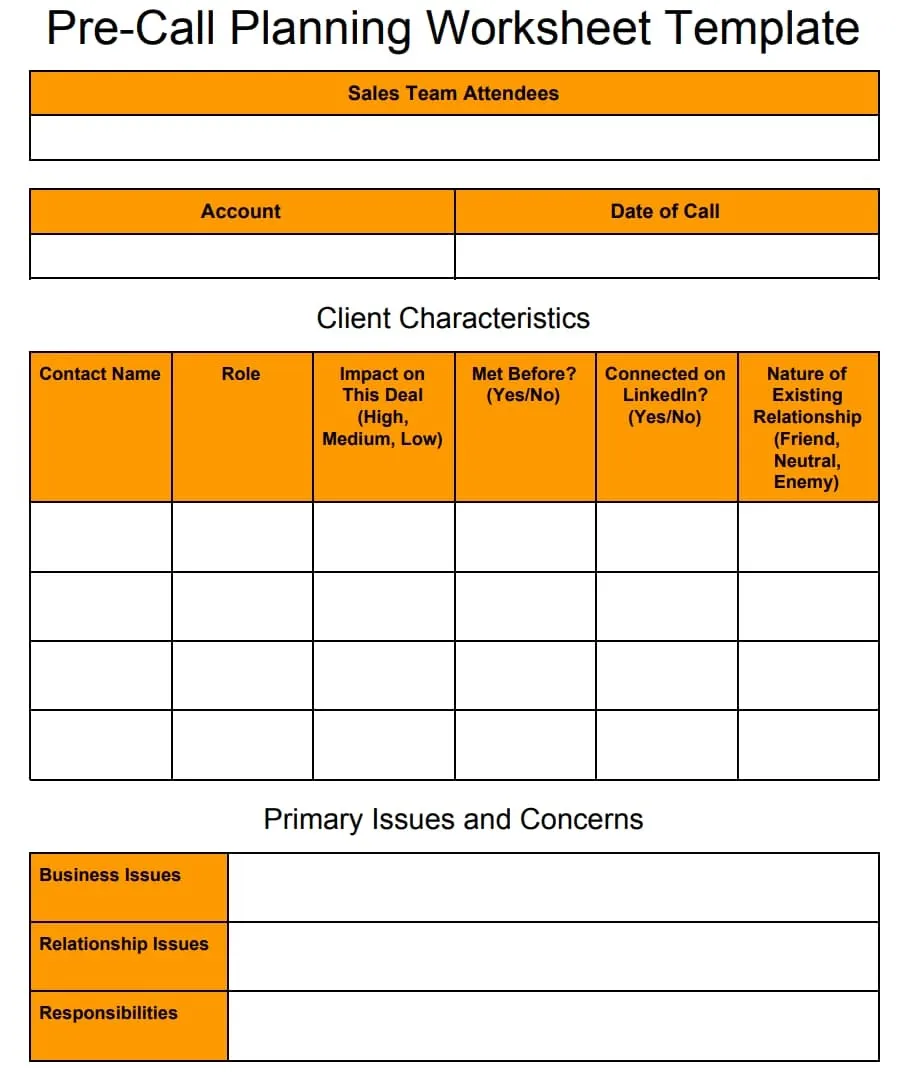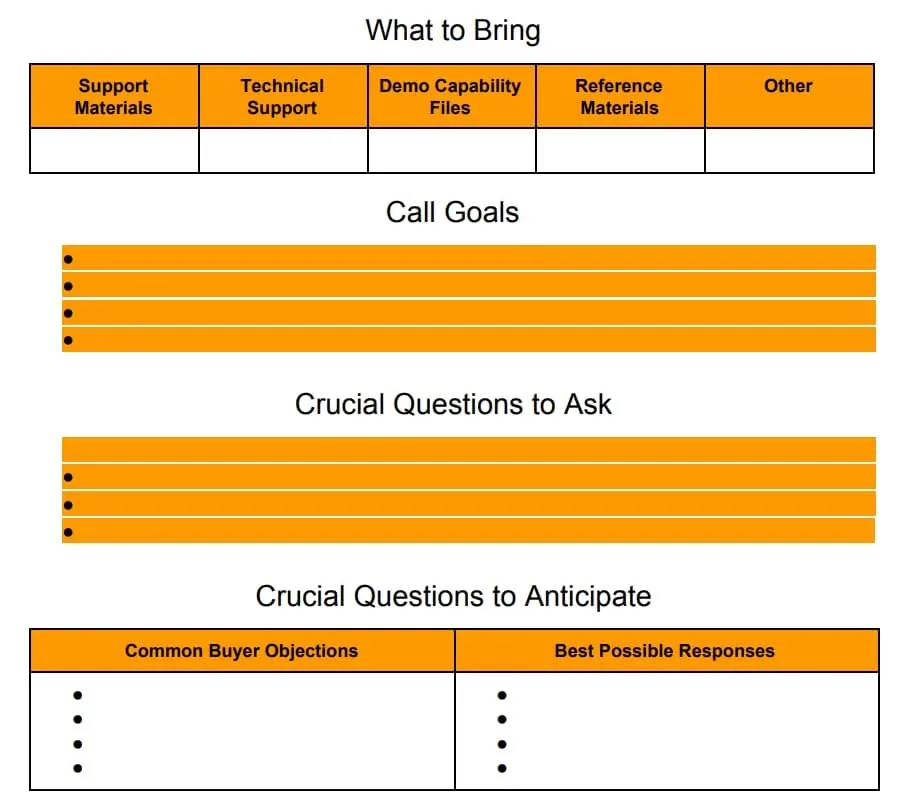The sales call — one of the most imposing, potentially uncomfortable realities of sales life. Navigating a sales call to success can be challenging, but if there is one thing that can make this process seamless, it is pre-call planning.

Pre-call planning is your guide amid these difficult conversations, ensuring you neither sound rehearsed nor unprepared. Striking that balance is key. Handling these calls isn’t just about instinct; it requires comprehensive, calculated preparation.
In this guide, we’ll better understand what your pre-call planning strategy should look like and provide a helpful template to guide you through the process.
- What is pre-call planning?
- The Benefits of Pre-Call Planning
- Steps for Effective Pre-Call Planning
- Pre-Call Planning Worksheet Template
What is pre-call planning?
Pre-call planning is the process of preparing and strategizing for a sales call by researching potential clients and understanding their needs. This ensures the conversation is tailored to address specific pain points, leading to a more focused and effective engagement.
The Benefits of Pre-Call Planning
Diving directly into a sales call without any preparation? It’s like setting sail without a compass. While you might make some progress, you’re unlikely to reach your desired destination efficiently. Enter pre-call planning — the compass to navigate your sales calls successfully.
Here are some of the benefits of pre-call planning.
.webp)
Provides Direction and Purpose
With pre-call planning, you’re not just tossing words into the wind and hoping they resonate. Every conversation has a clear objective and an underpinning strategy. It gives your call a sense of purpose, ensuring you and your potential client are on the same page.
Helps Boost Confidence
Have you ever felt a sense of uncertainty before a sales call? This often happens because of the lack of preparation. Pre-call planning acts as a confidence booster. With everything in place, you can step into the conversation with confidence and clarity.
Enhances Time Efficiency
Time is money, especially in sales. Pre-call planning eliminates unnecessary deviations and keeps the conversation streamlined. By staying on track and cutting the fluff, you maximize both your and the prospect’s time.
Yields Better Outcomes
Ultimately, the goal of a sales call is conversion. While there’s no guaranteed formula in sales, pre-call planning definitely gives you an edge. With thorough planning, you stand a strong chance of leading the call to a successful outcome.
Steps for Effective Pre-Call Planning
- Conduct in-depth research of your prospect's business landscape.
- Know who you're going to be talking to.
- Explore mutual connections in your professional circles.
- Establish firm goals for the call.
- Ensure all necessary support materials are ready.
- Prepare some insightful questions.
- Anticipate potential objections and queries from your prospect.
1. Conduct in-depth research of your prospect’s business landscape.
Here’s where you establish your baseline. Take the time to develop a fundamental understanding of what your prospect is dealing with. That means deeply diving into factors like their industry, competition, financial situation, and resources they’re already leveraging. This enables you to understand how to convey specific values of your product or service.
For instance, say you’re selling conversational intelligence software. Your prospect is a brand that sells an ecommerce platform to small to midsize businesses. Before your call, you would need to understand the general landscape of your prospect’s industry and the specific issues they might be coping with.
Here are a few questions that might help you understand your prospects better:
- How is your prospect’s company fairing compared to other ecommerce platforms?
- Is it already leveraging a conversational intelligence platform to support its sales efforts?
- Is it in a good place financially?
- Does it have the budget to invest in a platform like yours?
- Can you pin down the specific hiccups the business is constantly running into?
Suppose your research reveals that the company is struggling as a mid-tier option due to mediocre sales. And it also hasn’t invested in one of your competitors yet.
Additionally, through some digging and outreach, you discover their struggles with prolonged onboarding for new sales staff and inconsistent messaging during sales calls.
With that kind of research behind you, you can pinpoint specific, relevant pain points during your call. You can trim the fat from your conversation and offer solutions tailored to the prospect’s needs — allowing you to present a thorough, well-crafted value add.
2. Know who you’re going to be talking to.
Before your call, you need to know as much as possible about your specific points of contact — such as their role, decision-making authority, or historical interactions with your company, if any.
You must understand that an initial chat with a lower-level rep won’t be the same as a conversation with a C-level executive. Beyond that, conducting more personal research on your prospective caller will significantly help.
LinkedIn is one of the better starting points for that process. Try to gather information such as:
- How long have they been at their company?
- How long have they been in the industry?
- What are their specific responsibilities?
- Are there any secondary sources — like interviews or thought leadership content — that can offer insight into their expertise and personality?
Let’s refer back to the conversational intelligence platform example. You find out that you will be speaking with Charles E. Cheese. Immediately after learning who will be on the call, you pore through Charles’ LinkedIn page to see what you can find about him.
You learn that Charles is a sales director with several impressive accomplishments and critical responsibilities under his belt.
He’s been in the SaaS industry for about 20 years — nine of which he spent at his current company. And, he has also published some in-depth thought leadership pieces that conversationally discuss relatively inaccessible topics.
From that background, you could deduce that Charles probably has decision-making authority regarding sales enablement technology.
You could also assume that, given his extensive experience in his field, he’s more interested in proven solutions as opposed to younger, more novel products. And finally, his writing tells you that he’s relatively laid back but values technical knowledge.
With this level of knowledge, you can refine your pre-call planning, determine your conversational style, the key issues to highlight, and the technical depth to showcase.
3. Explore mutual connections in your professional circles.
Perhaps the most crucial component of a successful sales call is trust. If exhibiting your extensive knowledge is a way to enhance it, another effective means can be referring to mutual contacts.
If you can talk about your relationship with someone your prospect trusts and respects, you can add a new degree of legitimacy to your call. Again, LinkedIn can be a great starting point to explore this.
Continuing with the previous example, you might look over Charles E. Cheese’s LinkedIn profile and explore your mutual connections. Suppose you notice that one of the mutual connections is a sales director you sold your product to — we’ll call her Lola Bunderson.
In your conversation, you could bring up Lola during any initial small talk. If he speaks highly or familiarly of her, you can casually highlight your relationship with her and subtly mention she’s a valued client who has loved your product.
This step isn’t necessarily the easiest or most reliable one on this list, but it’s still worth exploring. Take some time to see if your and your prospect’s networks overlap. It’s a nice tidbit to keep in the back pocket that might help you put your contact at ease and establish some extra credibility.
4. Establish firm goals for the call.
Not every call is going to land you a deal. In fact, that’s generally not the endgame. What you want or can expect out of a call varies based on where you are in your sales cycle and who you’re talking to.
Maybe the call is to learn more about your point of contact. It could be to better understand the circumstances of the specific team or company you’re targeting.
Your goal could be moving the deal further by getting in touch with someone at a higher level — ideally, one with decision-making authority. The point is that you need to know what you want from your call. That will set the tone and dictate the nature of the conversation.
In our example, you’re in touch with Charles — a legitimate decision-maker. However, you understand that you probably won’t be able to close on your first call. So you set realistic expectations and decide that your goal for your first call with Charles is to schedule a demo with him. That becomes your endgame. That’s what you tailor your pitch and messaging around.
5. Ensure all necessary support materials are ready.
Thorough preparation for your call is key. You need to be able to reference relevant information — whether it be technical, process-oriented, or anecdotal. It can be tough to memorize all that; and frankly, you shouldn’t be expected to. That’s why it doesn’t hurt to have some support materials on hand to help you explain the ins and outs of your product or service.
Technical specs, case studies, and specific insight about your prospect’s company can and should be at your disposal for your call. Gather whatever you can that you feel will help guide you through the process.
Make sure you’re thorough in sourcing and organizing this information. You don’t want to find yourself hastily and haphazardly shuffling through support materials you don’t totally understand mid-call.
For our example, you might want to have some technical specifications on hand. You’re trying to book a demo with Charles, and it could help to provide some insight into how your product works and what he can expect to see.
You might also want to have a relevant case study for a similarly sized SaaS company that saw success with your platform at your disposal. Perhaps you can mention Lola Bunderson here, a name Charles is already familiar with.
Citing precise instances of how your product benefited businesses can resonate with Charles’s situation. It also showcases your grasp of industries like his, paving the way for trust — the key to an effective sales call.
6. Prepare some insightful questions.
Here’s where you can explicitly demonstrate that you have researched and know your prospect. In asking thoughtful, relevant questions, you’re demonstrating that you took the time to understand the nuances of your prospect’s business.
Preparing questions beforehand might sound like scripting, but it’s not the same. Thoughtful questions start a discussion, whereas scripting tries to dictate one. That being said, if you plan your side of that dialogue and stick to it rigidly, you’re crossing the line.
In the example we’ve been referencing, you might refer to your extensive research and prior conversations and ask Charles questions like:
- “During past discussions with your team members, challenges related to onboarding new hires were mentioned. Could you shed more light on that?”
- “It appears your reps thrive deeper down in the sales funnel but face challenges with prospecting, especially reply rates. Is that correct?”
- “Your platform’s point of sale feature is something of an industry standard. Do you think your messaging is doing enough to stress its value?”
It’s important to ask questions that reflect your prospect’s company both internally and externally. Show that you understand how the company operates, its place in its industry, and how it functions as a whole. That way, your prospect knows you value their time and potential business.
7. Anticipate potential objections and queries from your prospect.
It’s important to think a few steps ahead when pre-call planning. You can save yourself a lot of stress and trouble by preparing for the issues you will likely encounter.
Familiarize yourself with the most common objections you deal with during your general sales efforts and plot compelling responses for your upcoming call.
Make sure you also apply your company research here. Identify concerns that your prospect, specifically, might raise. Try to identify challenges specific to your prospect’s industry, similarly sized businesses, or companies operating under similar financial circumstances.
In our example, you could consider the company’s financial circumstances. As their sales are down, and probably their budget is low, you could prepare yourself to answer concerns that might arise around pricing.
.webp)
Pre-Call Planning Worksheet Template
Pre-call planning can take a lot, and engaging in it can be an arduous process. Here’s a helpful template that covers its fundamental bases.


Pre-Call Planning Worksheet Template Download
Improving Your Sales Calls
Pre-call planning can be tedious and frustrating, but if you want to make the most of your sales calls, you have to do it right.
Cover all your bases before you get on the phone. Make sure you know what you want out of the call. Know who you’re talking to and what they’re dealing with, and be ready to maintain authority throughout the conversation while still giving your prospect room to participate.
Calculated preparation is key to addressing all these points. You can consider leveraging tools like HubSpot Sales Hub to streamline this preparation. It equips you with battle cards, call scripts, customer data, and playbooks tailored for optimal pre-call planning, ensuring you’re always one step ahead.
![Free Resource: 10 Sales Call Script Templates [Download Now]](https://no-cache.hubspot.com/cta/default/53/64e5789a-605c-4e14-90d9-8aa3df310ee1.png)

![The Best Cold Call Script Ever [Template]](https://www.hubspot.com/hubfs/cold-call-script-1.jpg)







